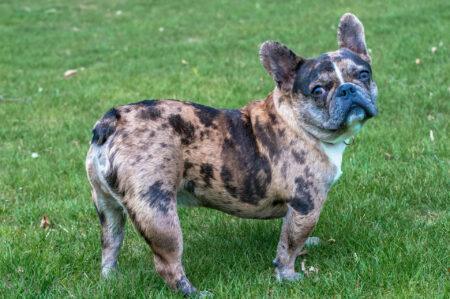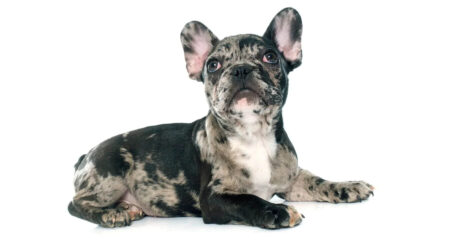Merle French Bulldogs have become increasingly popular in recent years due to their unique coat color pattern. While they may appear similar to their standard-colored counterparts, Merle French Bulldogs have distinct markings that set them apart.
This article will explore everything you need to know about Merle French Bulldogs, including their appearance, temperament, health concerns, and breeding controversy. Whether you are considering adding a Merle French Bulldog to your family or simply want to learn more about this fascinating breed variation, this article will provide you with all the information you need. So let’s dive in and discover the world of Merle French Bulldogs!
Overview of Merle French Bulldog
Merle French Bulldogs are a unique variation of the popular French Bulldog breed. They share many characteristics with standard French Bulldogs, but their distinct coat pattern sets them apart. Here is everything you need to know about Merle French Bulldogs:
Merle French Bulldogs are known for their striking coat pattern, which features patches of diluted color on a solid base. They have a compact and muscular body, with a strong bone structure and distinctive bat-like ears. They have a friendly and sociable nature, which makes them excellent family pets.
Height and Weight:
Merle French Bulldogs are generally small in size, standing between 11 to 12 inches (28 to 30 cm) tall at the shoulder. They usually weigh between 16 to 28 pounds (7 to 12 kg), with females being slightly smaller than males.
Lifespan:
On average, Merle French Bulldogs have a lifespan of 10 to 12 years. However, with proper care and attention, they can live longer.
Colors:
Merle French Bulldogs can come in various colors, including blue, chocolate, fawn, lilac, and more. The merle pattern creates a marbled effect on their coat, with patches of lighter or darker color.
Temperament:
Merle French Bulldogs are known for their friendly and affectionate nature. They are sociable and get along well with children and other pets. They love attention and are eager to please their owners. However, like all French Bulldogs, they can be stubborn at times, so early training and socialization are important to ensure they become well-behaved and obedient companions.
Grooming:
Merle French Bulldogs have a short, smooth coat that requires minimal grooming. Regular brushing will help keep their coat looking clean and shiny. They are average shedders throughout the year and may need additional grooming during shedding seasons. It’s also important to keep their facial wrinkles clean and dry to prevent skin infections.
Exercise:
Despite their small size, Merle French Bulldogs have moderate exercise needs. Daily walks and playtime will help keep them mentally and physically stimulated. However, they are not overly active dogs and are well-suited for apartment living, as long as they get regular exercise.
Training:
Training a Merle French Bulldog should be done with positive reinforcement methods. They respond well to praise, treats, and consistent training techniques. Early socialization and obedience training are essential to ensure they grow up to be well-behaved and well-adjusted dogs.
It’s important to mention that Merle French Bulldogs are a controversial topic in the breeding community. This is because the merle color pattern is a result of a genetic mutation that can cause health issues, particularly when two merle dogs are bred together. The breeding of two-merle French Bulldogs, known as “double merle” breeding, can increase the chances of puppies being born with serious health problems, including deafness, blindness, and other neurological issues. Responsible breeders avoid double-merle breeding to prioritize the health and welfare of the dogs.
Characteristics of Merle French Bulldog
Merle French Bulldogs are known for their distinct coat pattern, which is characterized by patches of diluted color on a solid base. Here are some key characteristics of Merle French Bulldogs:
Coat Color: The most notable characteristic of Merle French Bulldogs is their unique coat color pattern. The merle pattern is a marbled effect created by patches of lighter or darker color on a solid background. The colors can vary and include shades of blue, chocolate, fawn, lilac, and more.
Size: Merle French Bulldogs are small-sized dogs, standing about 11 to 12 inches (28 to 30 cm) tall at the shoulder. They generally weigh between 16 to 28 pounds (7 to 12 kg).
Body Structure: They have a compact and muscular body with a strong bone structure. They have a broad chest, a short and sturdy neck, and characteristic bat-like ears.
Temperament: Merle French Bulldogs are known for their friendly and sociable nature. They are typically good-natured, affectionate, and get along well with children and other pets. They love attention and enjoy being a part of the family.
Health Concerns: Like all French Bulldogs, Merle French Bulldogs may be prone to certain health issues. Some common health concerns in this breed include eye problems (such as cataracts and progressive retinal atrophy), respiratory issues (due to their short snouts), skin allergies, and spinal abnormalities. It’s crucial to choose a responsible breeder who performs health screenings on their breeding dogs to reduce the risk of inherited health conditions.
Exercise and Training: Merle French Bulldogs have moderate exercise needs. Daily walks and playtime are essential for their physical and mental stimulation. They are not overly active dogs but still require regular exercise to maintain a healthy weight. Positive reinforcement-based training methods work best with this breed, as they respond well to praise, treats, and consistency.
Grooming: Merle French Bulldogs have a short and smooth coat that requires minimal grooming. Regular brushing helps keep their coat clean and removes loose hair. They are average shedders throughout the year, and additional grooming may be required during shedding seasons. It’s important to keep their facial wrinkles clean and dry to prevent skin infections.
Appearance of Merle French Bulldog
The “merle” pattern is a coat coloration that is characterized by a mottled or patchy appearance, with areas of the coat appearing darker or lighter than the rest. The merle pattern is caused by a mutation in the gene that controls the production of melanin, the pigment that gives color to the hair, skin, and eyes. Merle French Bulldogs typically have a blue or gray coat with areas of white, cream, or fawn. They may also have patches of brown or black on their coat. Merle French Bulldogs may have blue or green eyes, and some may even have heterochromia.
Temperament of Merle French Bulldog
Merle French Bulldogs are known for their sweet and gentle temperament. They are generally friendly and outgoing, and they love to be around people. Merle French Bulldogs are also known for being intelligent and trainable, though they can sometimes be stubborn. They are usually playful and active, and they make great family pets. However, like all dogs, they need proper training and socialization from a young age. Merle French Bulldogs may also be more prone to certain health problems than other French Bulldogs, such as hearing and vision issues. With proper care and attention, a Merle French Bulldog can make a great addition to any family.
SEE ALSO: How to Fatten Up A Malnourished Dog
Cost of Merle French Bulldog
The cost of a Merle French Bulldog can vary significantly depending on various factors such as the pedigree, lineage, coat color, breeder reputation, location, and demand. Generally, Merle French Bulldogs tend to be more expensive than standard-colored French Bulldogs due to the uniqueness of their coat pattern.
On average, you can expect to pay anywhere from $3,000 to $10,000 or even more for a Merle French Bulldog puppy from a reputable breeder. Some exceptionally rare color combinations or exceptional bloodlines may command even higher prices.
It’s important to be cautious of breeders offering Merle French Bulldogs at significantly lower prices as it could be an indication of unethical breeding practices or health issues. Remember that purchasing a puppy is not just about the initial cost but also the long-term commitment and responsibility of providing proper care, health care, and training.
Additionally, owning a Merle French Bulldog comes with potentially higher costs for veterinary care due to potential health issues associated with the Merle color gene. It’s crucial to factor in ongoing expenses, such as vaccinations, routine check-ups, grooming, and quality nutrition.
Always do thorough research and consider consulting with reputable breeders or breed clubs to ensure you are making an informed decision and are prepared for the financial responsibilities that come with owning a Merle French Bulldog.
The Rarity of Merle French Bulldog
Merle French Bulldogs are quite rare, with only a small percentage of French Bulldogs having the merle gene. The rarity of the Merle gene is due to the fact that it is a recessive gene, meaning that both parents must carry the gene in order for their offspring to inherit it. As a result, finding a breeder who specializes in breeding Merle French Bulldogs can be difficult. The rarity of the merle gene also contributes to the higher price tag that these dogs often come with. Even though they are rare, Merle French Bulldogs have become increasingly popular in recent years.
Health Conditions of Merle French Bulldog
Merle French Bulldogs, like other French Bulldogs, can be prone to certain health conditions. While not all Merle French Bulldogs will develop these conditions, it’s important to be aware of them if you are considering getting one as a pet. Here are some common health conditions that can affect Merle French Bulldogs:
- Eye Problems: Merle French Bulldogs may be more susceptible to certain eye conditions such as cataracts, progressive retinal atrophy (PRA), and cherry eye. Regular eye examinations by a veterinarian are important to monitor and address any potential eye issues.
- Respiratory Issues: French Bulldogs, including Merle French Bulldogs, have brachycephalic (short-nosed) faces, which can lead to respiratory difficulties. They may suffer from conditions such as brachycephalic syndrome and obstructive airway syndrome. It’s important to ensure they have proper ventilation, avoid excessive heat, and monitor their breathing during exercise.
- Skin Allergies: Some Merle French Bulldogs may be prone to skin allergies, which can cause itching, redness, and infections. Regular grooming and a healthy diet can help manage and prevent these allergies.
- Spinal Abnormalities: Merle French Bulldogs, particularly those with additional genetic factors, may be at a higher risk of developing spinal abnormalities such as hemivertebrae or intervertebral disc disease. These conditions can cause back pain, and mobility issues, and potentially require medical or surgical intervention.
It’s important to note that responsible breeders perform health screenings on their breeding dogs to reduce the likelihood of passing on these genetic conditions to their puppies. When considering a Merle French Bulldog, it’s crucial to choose a reputable breeder who prioritizes the health and well-being of their dogs.
How to Care for a Merle French Bulldog
Caring for Merle French Bulldogs involves providing them with proper nutrition, regular exercise, regular veterinary care, grooming, and a safe and stimulating environment. Here are some essential care tips for your Merle French Bulldog:
- Nutrition: Provide your Merle French Bulldog with a balanced and high-quality diet that meets their specific nutritional needs. Consult with your veterinarian to determine the appropriate portion sizes and feeding schedule based on their age, weight, and activity level.
- Regular Exercise: Despite their small size, Merle French Bulldogs need regular exercise to keep them physically and mentally stimulated. Daily walks, interactive play sessions, and mental stimulation activities are essential to prevent obesity and maintain their overall health.
- Veterinary Care: Schedule regular veterinary check-ups for your Merle French Bulldog to monitor their health and address any concerns promptly. Vaccinations, parasite prevention (fleas, ticks, and heartworms), and dental care are important aspects of their overall healthcare routine.
- Grooming: Merle French Bulldogs have a short and smooth coat that requires regular brushing to remove loose hair and keep their coat clean and healthy. Pay special attention to cleaning their facial wrinkles to prevent skin infections. Regular nail trimming, teeth brushing, and ear cleaning should also be included in their grooming routine.
- Climate Control: Merle French Bulldogs are sensitive to extreme temperatures, especially heat. Avoid exercising them in hot weather and provide them with a cool and well-ventilated environment. Be cautious of overexertion and ensure they have access to fresh water at all times.
- Obedience Training: Start training your Merle French Bulldog from a young age to establish good behavior and obedience. Positive reinforcement methods, such as rewards and praise, work well for these intelligent and eager-to-please dogs. Socialization with other animals and different environments is also crucial to ensure they grow up to be well-adjusted dogs.
- Safety Considerations: Merle French Bulldogs may have a prey drive, so it’s important to ensure their safety when outdoors. Use a secure leash and harness during walks and supervise them when in unfenced areas. Additionally, provide a safe and secure environment at home, free from any hazards that could potentially harm their well-being.
SEE ALSO: When to Worry About Your Cat Drinking a Lot of Water
FAQs
Q. Can you breed 2 merle Frenchies?
A. It is not recommended to breed two merle French Bulldogs together. Merle French Bulldogs have a higher risk of producing offspring with serious health problems, such as blindness, deafness, and skin abnormalities. This is because the merle gene can cause abnormalities in the coat coloration, as well as in other parts of the body. While breeding two merle French Bulldogs together may result in some puppies with striking coats, it is not worth the risk of producing puppies with serious health issues.
Q. What can merle French Bulldogs eat?
A. Merle French Bulldogs have the same dietary needs as any other French Bulldog. They require a high-quality, nutritionally balanced diet that is appropriate for their age and activity level. It is best to avoid giving your dog table scraps or people food, as these can upset their stomachs and lead to weight gain. Instead, opt for a commercially available dog food that is specifically formulated for French Bulldogs.
Q. How do you train a Merle Frenchie?
A. Training a Merle Frenchie is similar to training any other French Bulldog. It is important to start training at an early age, using positive reinforcement techniques such as praise, treats, and play. Be patient and consistent with your training, as Merle French Bulldogs can be stubborn at times. Start with basic obedience commands such as sit, stay, and come, and gradually introduce more advanced commands. Socialization is also an important part of training Merle Frenchie, as they need to be exposed to a variety of people, places, and situations from a young age.
Conclusion
In conclusion, Merle French Bulldogs are a unique and fascinating variation of the popular French Bulldog breed. Their striking coat color pattern, friendly temperament, and compact size make them a beloved choice for many dog owners. However, it’s important to be aware of the potential health concerns associated with the merle color gene and to choose a reputable breeder who prioritizes the health and well-being of their breeding dogs.
Proper care for Merle French Bulldogs involves providing them with a balanced diet, regular exercise, routine veterinary care, grooming, and a safe and stimulating environment. Ongoing training and socialization are also important to ensure they develop into well-behaved and well-adjusted dogs.


